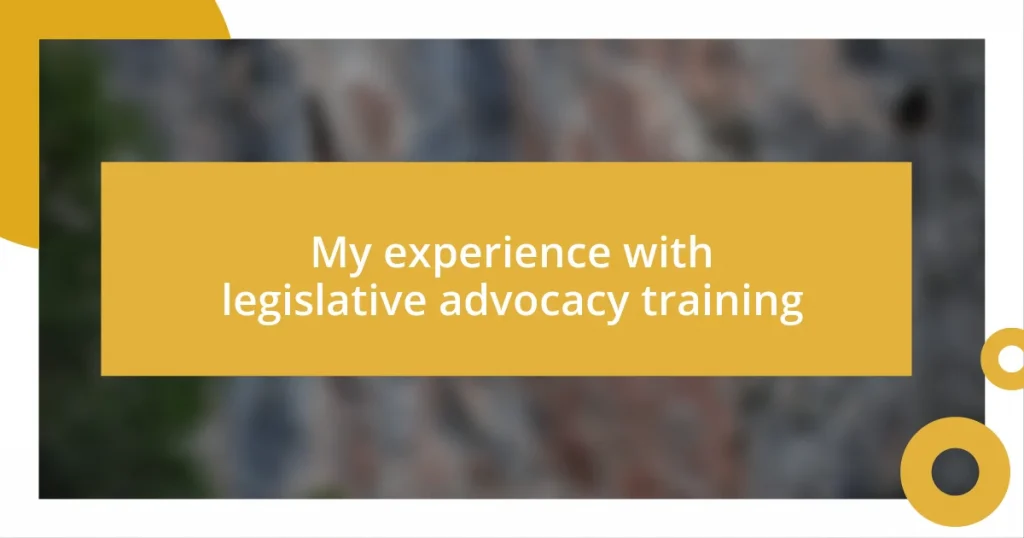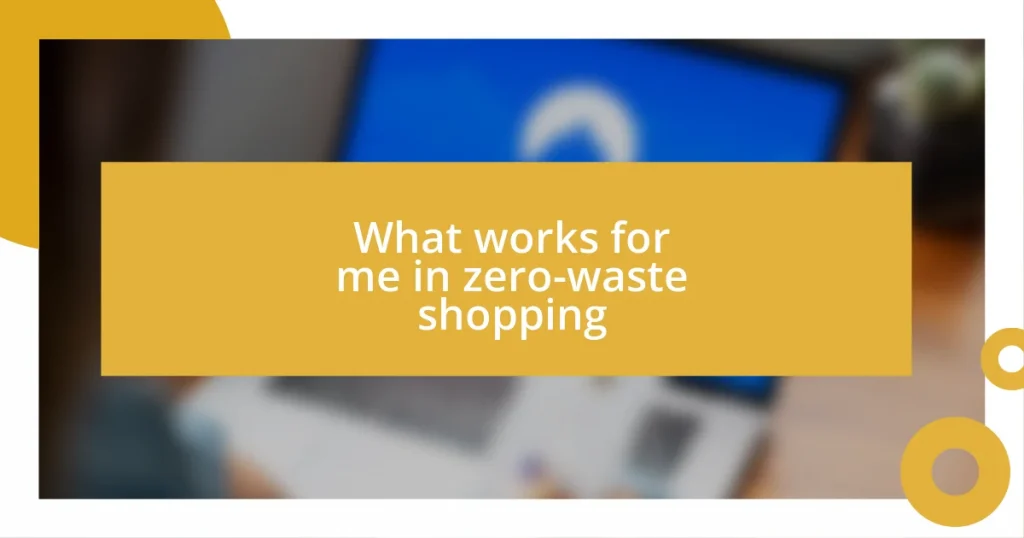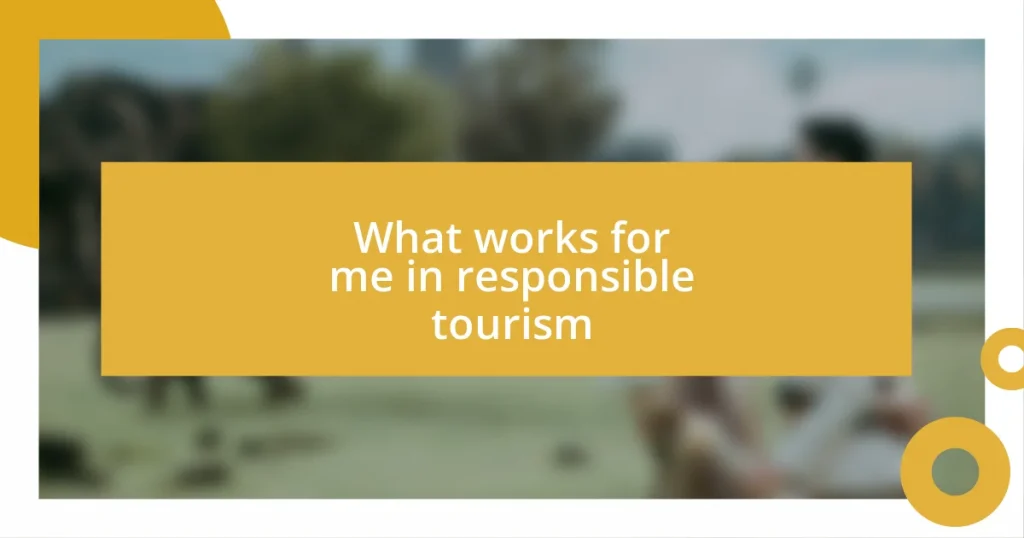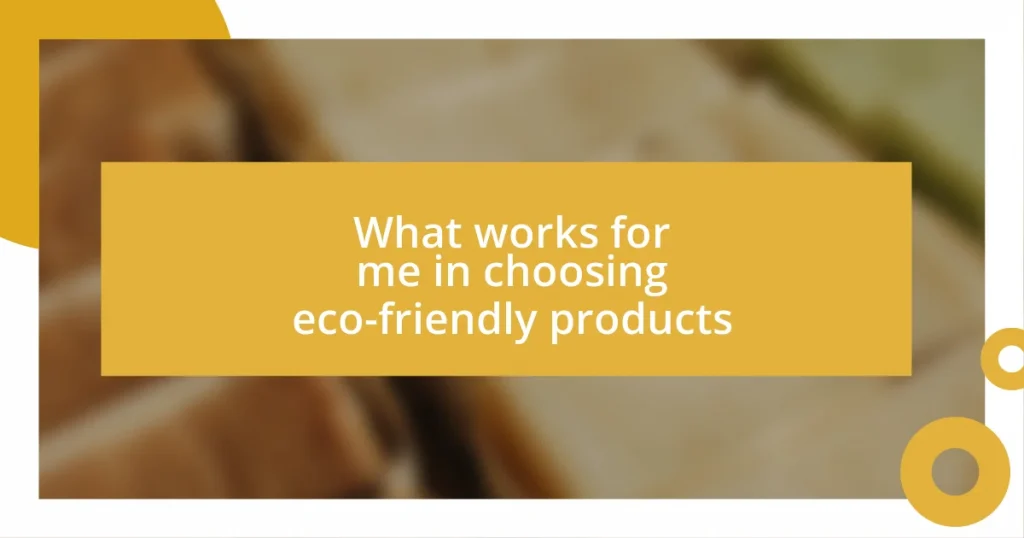Key takeaways:
- Legislative advocacy training empowers individuals by providing essential skills such as effective communication, relationship-building, and grassroots engagement.
- Experiential learning, mentorship, and community support are critical components that enhance the advocacy training experience.
- Successful advocacy efforts require clarity in messaging, active community engagement, and the importance of follow-up to foster lasting relationships with policymakers.
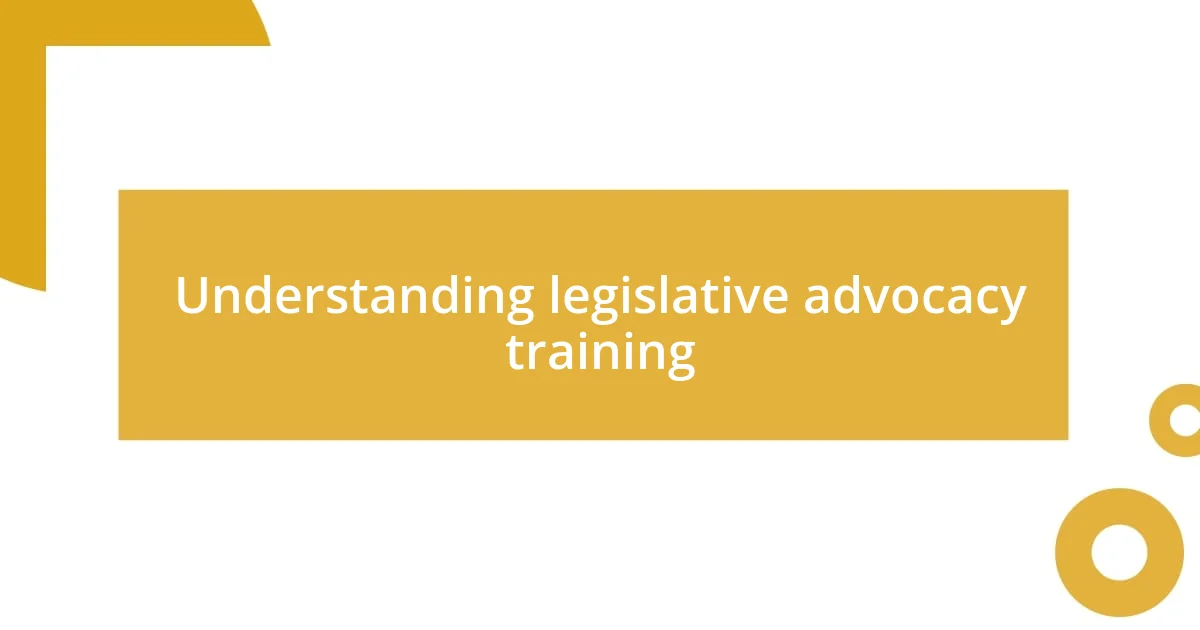
Understanding legislative advocacy training
Legislative advocacy training is a pivotal process that equips individuals with the skills to influence policy and decision-making. I still remember attending my first training session and feeling a mix of excitement and uncertainty. How could I, a regular citizen, possibly sway lawmakers? It turned out that the tools and techniques we learned there made the complex world of legislation seem much more accessible.
Through these workshops, participants gain a deeper understanding of how government works, including the legislative process and the importance of grassroots efforts. It was eye-opening for me to realize that every voice matters, especially when it comes to advocating for causes I truly cared about. This wasn’t just about speaking; it was about creating connections, raising awareness, and fostering change.
Moreover, the emotional journey during these trainings is significant. I distinctly felt a sense of empowerment as I learned to articulate my passion into persuasive arguments. Has there ever been a time when you felt compelled to make a difference? These trainings can transform that feeling into actionable steps, helping you navigate the complexities of advocacy with confidence and clarity.
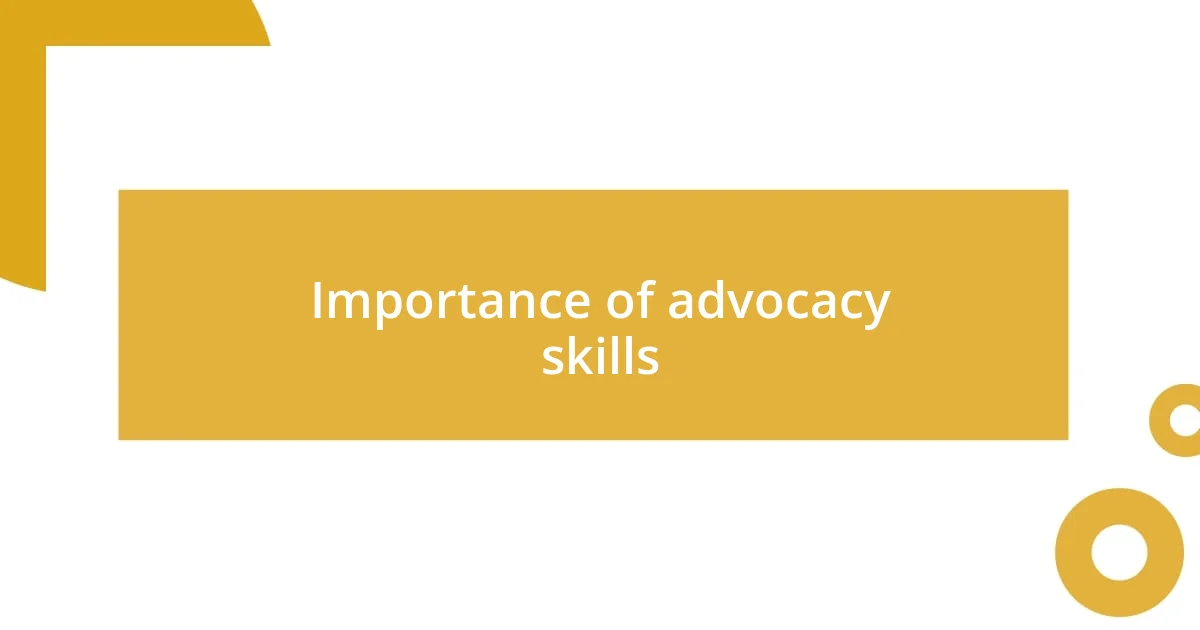
Importance of advocacy skills
Advocacy skills are essential for anyone looking to make a meaningful impact in their community or on specific issues. I learned firsthand how empowering it can be to speak up with confidence, fueled by solid training. These skills not only enable you to communicate your ideas effectively, but they also help you navigate the often complex landscape of legislation with ease.
Here are a few key reasons why advocacy skills are vital:
-
Effective Communication: Being able to express your ideas clearly is crucial. During my training, I found that understanding my audience greatly improved my persuasive abilities.
-
Building Connections: Advocacy isn’t just about the message; it’s also about relationships. I realized that networking with like-minded individuals amplifies our collective voice.
-
Influence on Decision-Making: With the right skills, anyone can influence policymakers, as I did when I successfully lobbied for a local issue that mattered to me.
-
Empowerment: Advocacy skills help individuals realize their own power and capability to instigate change. It was liberating to convert my passion into effective action.
-
Grassroots Engagement: Learning how to mobilize others for a cause strengthens community bonds. I experienced this firsthand when organizing local events that created real dialogue around important issues.
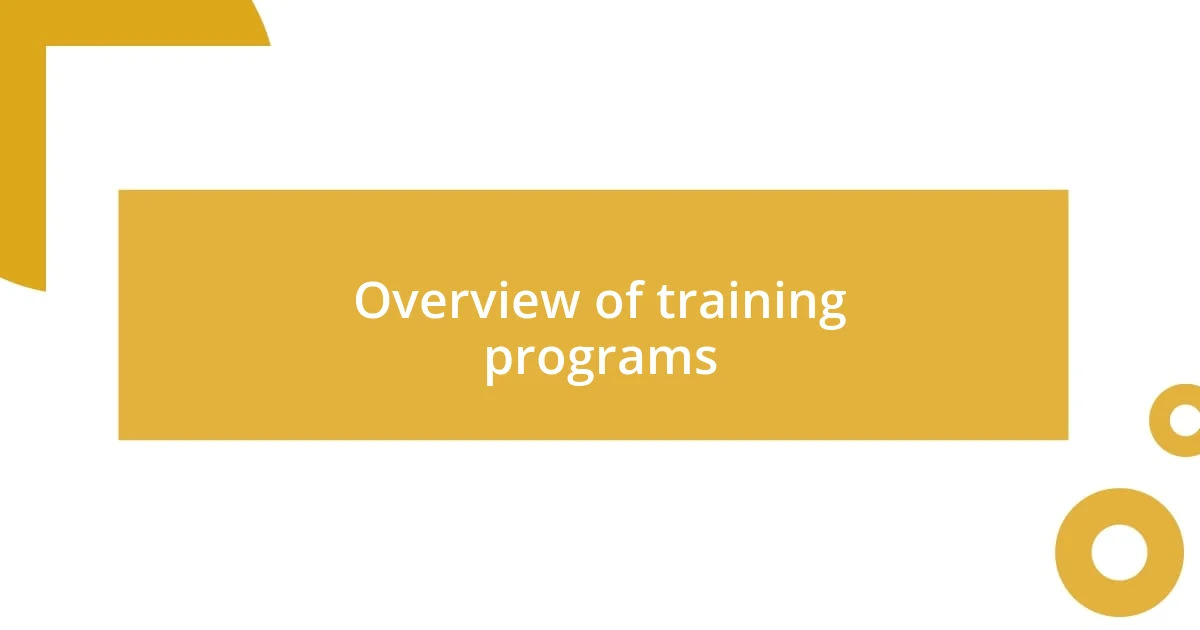
Overview of training programs
When exploring legislative advocacy training programs, you’ll find a variety of formats and approaches. Some programs are brief workshops, lasting just a few hours, focusing on fundamental skills like communication and networking. Others extend over several weeks, providing comprehensive training that dives deep into strategies for effective lobbying and grassroots engagement. Personally, I found that the longer programs enabled me to build stronger relationships with mentors who guided me through the nuances of the advocacy landscape.
Additionally, many training programs offer a hybrid model, combining in-person sessions with online resources. This was a game-changer for me; it allowed me to absorb information at my own pace while still having the opportunity to engage with peers in real time. Have you ever felt overwhelmed by the amount of information available? The blended approach made it manageable and even enjoyable, as I could revisit complex topics when needed.
Finally, it’s important to note that some training programs specifically cater to diverse audiences, such as youth, seniors, or marginalized communities. I vividly recall attending a program designed for young advocates where the energy was palpable and inspiring. Each participant brought unique perspectives, and I quickly learned that advocacy isn’t a one-size-fits-all endeavor; it’s about harnessing our distinct voices for a common cause.
| Training Program Type | Duration |
|---|---|
| Workshops | 1-3 hours |
| Extended Programs | 4-12 weeks |
| Hybrid Models | Flexible |
| Targeted Programs | Varies |
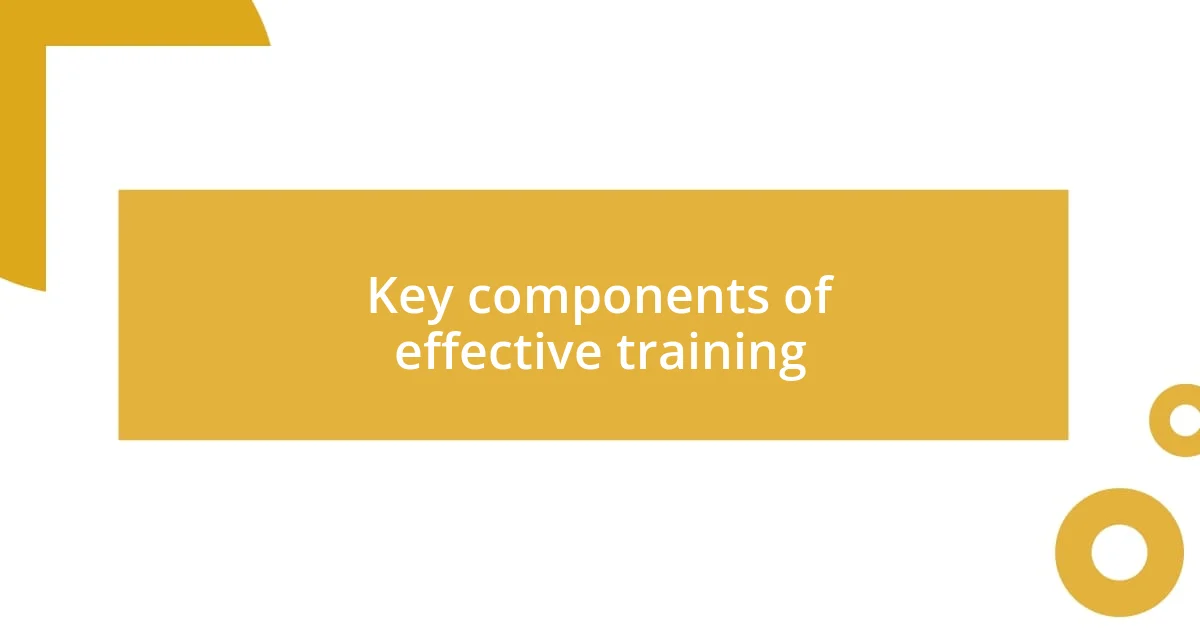
Key components of effective training
A key component of effective legislative advocacy training is experiential learning. I remember participating in a role-playing exercise that simulated a legislative session. It was a bit intimidating at first, but I quickly realized how crucial it is to practice real-world scenarios. This type of hands-on experience not only built my confidence but also helped me understand the dynamics of discussions in a legislative setting. Have you ever tried acting out a scenario to grasp the complexities of a situation? It was eye-opening for me.
Another important element is mentorship. During my training, I was lucky enough to be paired with a seasoned advocate who shared invaluable insights from their own experiences. Their guidance helped me navigate challenges I hadn’t even considered, and I felt a sense of camaraderie that made the learning process less daunting. Building a relationship with a mentor can elevate your advocacy skills immensely. Can you recall a time when someone’s guidance made a difference in your journey?
Finally, fostering a strong community among participants is vital. It’s amazing how sharing our individual stories creates an atmosphere of trust and encouragement. I distinctly remember one session where everyone shared their “why” behind advocacy, which sparked heartfelt conversations. That bonding experience reminded me that we’re all in this together, advocating for change rooted in our personal narratives. The support from peers can be just as essential as the skills you learn in training; isn’t it powerful to be part of a collective mission?
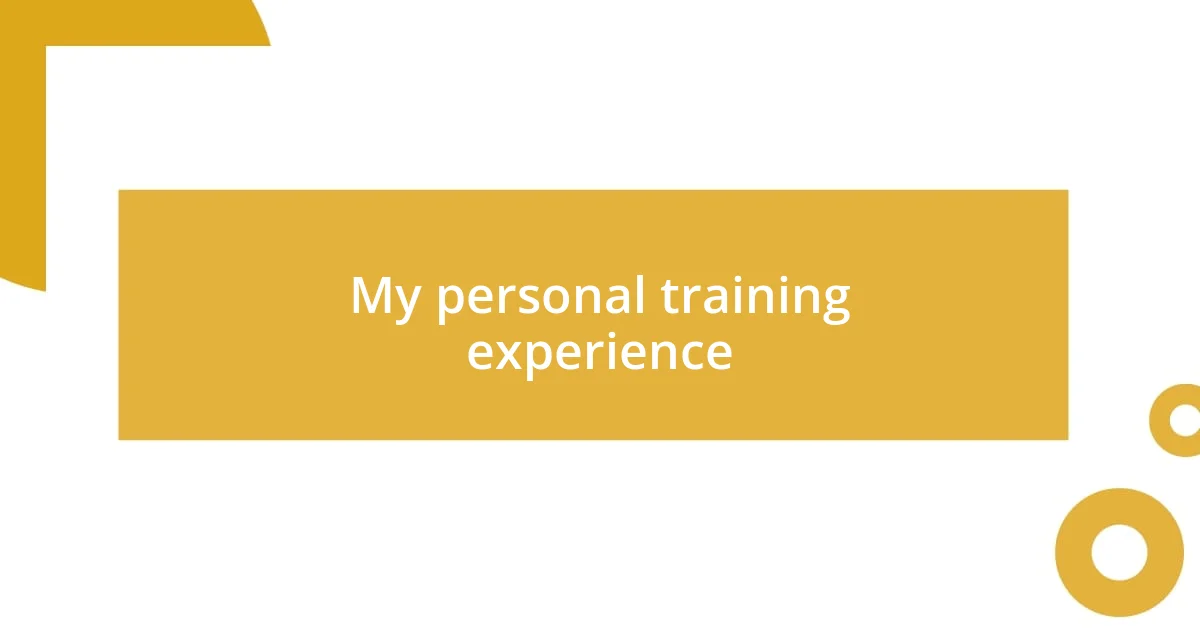
My personal training experience
I vividly remember my first day of training, filled with excitement and a hint of anxiety. The diverse group of participants shared their reasons for being there, which sparked an immediate connection. There was a young woman who had faced real barriers in her community and wanted to amplify those voices. Listening to her story was a reminder of how personal and impactful advocacy truly is. Don’t you think our experiences shape the way we fight for change?
One of the most transformative moments for me came during a small-group exercise where we simulated lobbying a fictitious lawmaker. I found myself channeling my inner advocate, passionately articulating my stance on an issue close to my heart. It felt exhilarating to step into that role, empowering me to embrace my voice. Have you ever felt that surge of adrenaline when speaking up for something you believe in? I walked away with not just skills but newfound confidence that I still carry today.
Reflecting on my overall experience, I appreciated the diverse techniques we explored. Whether through storytelling or data presentation, each method broadened my toolkit. One workshop on crafting compelling narratives struck a chord with me—realizing that connecting emotionally with our audience can be as significant as presenting facts. This made me wonder, how can we each harness our stories to drive meaningful conversations? It’s an ongoing journey, and I’m excited to continue developing these skills.
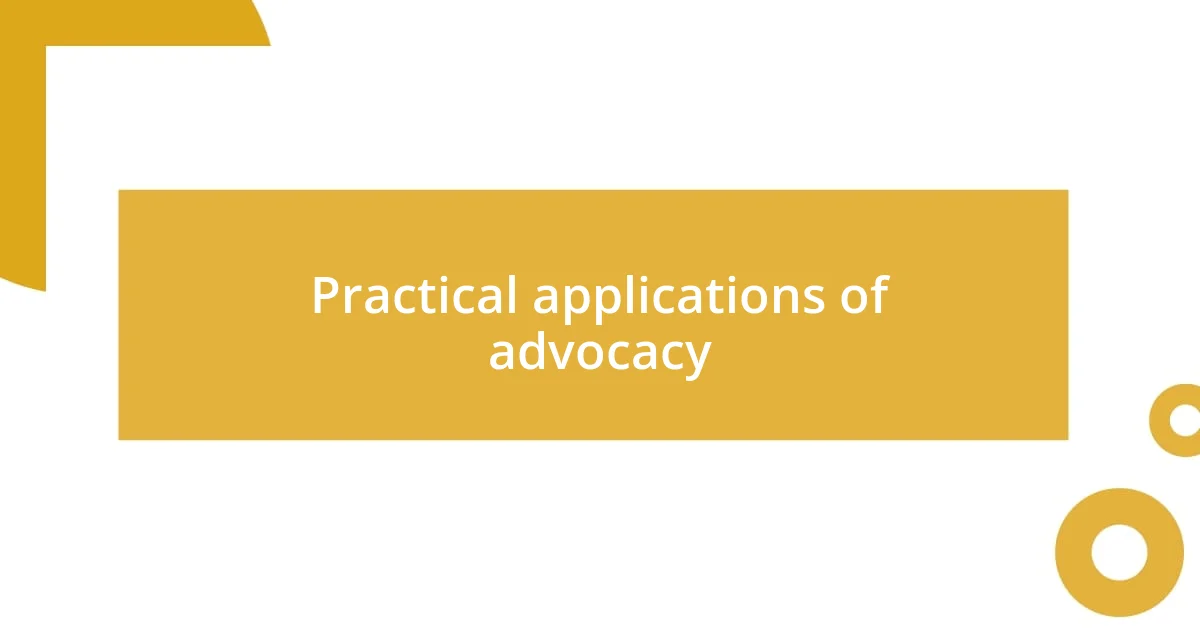
Practical applications of advocacy
Understanding the practical applications of advocacy is crucial, especially when it comes to translating training into real-world impact. For me, attending a community town hall meeting after training was a transformative experience. I remember feeling the palpable energy in the room as residents voiced their concerns. It made me realize how advocacy isn’t just about having a voice; it’s about creating spaces for others to be heard. Have you ever felt the urgency of advocating for your community in a live setting like that?
One of my most memorable applications of advocacy occurred when I volunteered for a local campaign that aimed to address housing issues. I started crafting messages and organizing grassroots events, which helped me understand the impact of strategic communication. The thrill of watching our organized efforts bring people together motivated me to dig deeper into community needs. Have you found that the right message at the right time can be a powerful catalyst for change?
Moreover, I’ve discovered the value of coalition-building. By collaborating with various organizations focused on education, healthcare, and housing, I learned how interconnected issues often overlap. I recall a moment when different groups came together to present a united front to local policymakers; the strength of our shared voices was undeniable. Don’t you think there’s something truly inspiring about standing shoulder to shoulder with others who share a vision for change? This experience showed me the power of collaboration in advocacy, reinforcing my belief that we are stronger together.
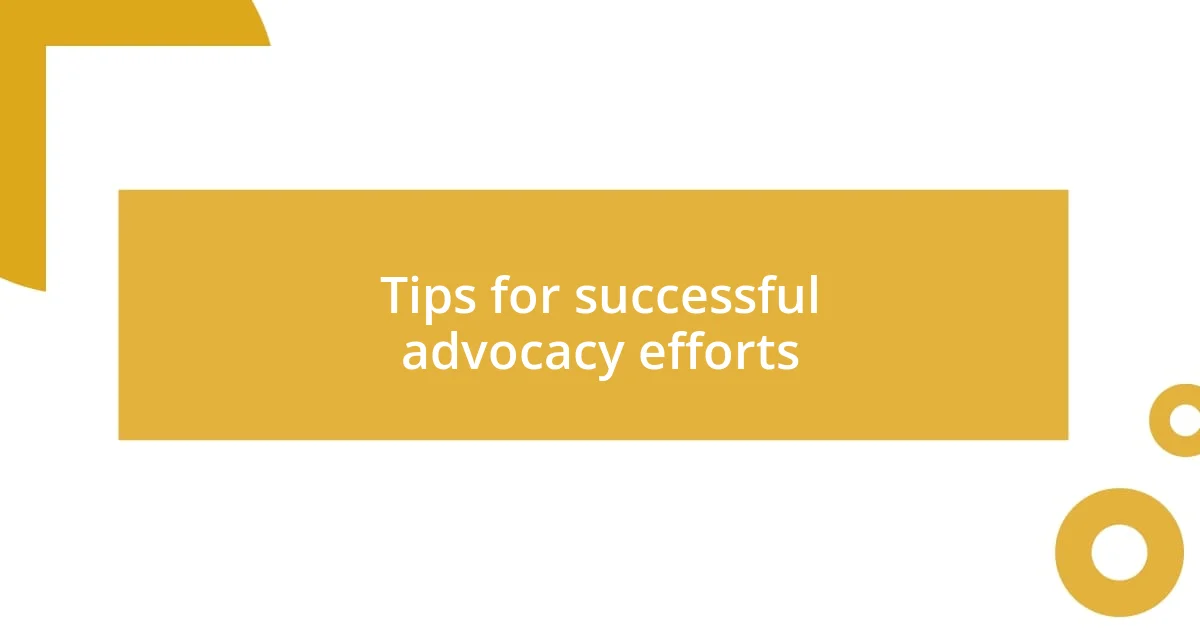
Tips for successful advocacy efforts
Building a successful advocacy effort is all about clarity in your message. I remember preparing for an important meeting where I outlined my key points on a notepad, frozen with uncertainty. The clarity I gained from simplifying my message allowed me to communicate effectively, ensuring that my audience could connect with my passion. Have you ever seen how powerful a straightforward message can be? It cuts through the noise and captures attention.
Engaging with your community isn’t just a tactic; it’s essential. When I organized a community event, I made it a point to not just speak but to listen. Creating an open dialogue with attendees helped deepen the relationships and trust, making them feel valued and heard. Can you recall a time when being part of a conversation shifted the mood of an entire group? That shared connection often ignites collective action.
Speaking from personal experience, it’s crucial to embrace the power of follow-up. After a lobbying event, I took the time to send thank-you notes and additional information to the lawmakers I had met. They appreciated my initiative, and it helped to solidify our relationship. Isn’t it interesting how a small gesture can leave a lasting impact? Every follow-up can reinforce your commitment to the cause you believe in, turning a simple interaction into a foundation for future advocacy efforts.










